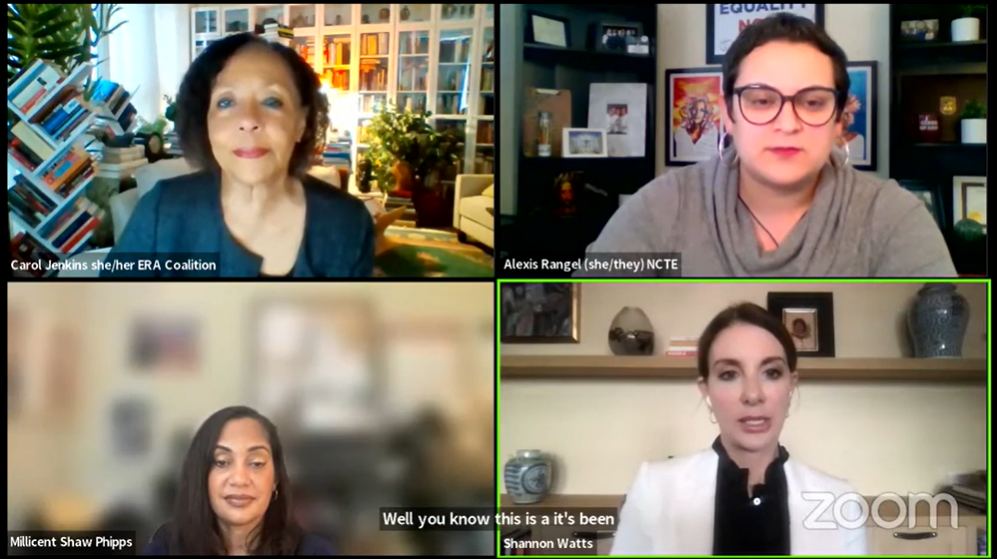Six Years Ago, Virginia Made History for the Equal Rights Amendment
January 27, 2026
The ERA Coalition/Fund for Women’s Equality continued it’s town hall series in April with a discussion on gender-based gun violence, hosted with support from the Harnisch Foundation.
ERA Coalition/FFWE president and CEO Carol Jenkins was joined in conversation by Shannon Watts, founder of Moms Demand Action; Alexis Rangel, Policy Counsel at the National Center for Transgender Equality; and Millicent Shaw Phipps, Legal Director at UJIMA: National Center on Violence Against Women in the Black Community, who filled in for Karma Cottman.
The overall theme of the discussion was gender-based gun violence, but specifically focused on Black women and trans women and non-binary people – communities targeted with disproportionately high rates of gun violence.
To begin the discussion, Shannon shared that while her story as an advocate began with the mass shooting of children at Sandy Hook Elementary School, 100 Americans are shot and killed every day; and 200 more are shot and wounded. It’s those instances of shootings that happen every day and often don’t make national news that comprise many of the instances of gender-based gun violence.
Alexis was asked about anti-trans legislation in the states, and she pointed out that, “This past year alone we’ve seen 200 anti-trans bills in 25 states around the country, 140 of them introduced since January alone.” These bills condition society to be suspicious of trans folks, putting them in danger. “Already this year we’ve seen more than 13 murders of trans people, most of them with the use of a gun.”
Millicent stated that Black women are disproportionately susceptible to gun violence and community violence, not just intimate partner violence. “That is unfortunately the reality in our society…Some of it due to the fact that Black women’s lives are not valued or seen as valuable.”
Asking what can be done at the federal level, if Congress doesn’t act, participants seemed hopeful. President Biden is trying to address gun violence with Executive Orders, specifically addressing violence against trans people with a trans interagency working group that was announced last summer, and identifying violence against trans people as a serious issue that needed more research.
Alexis also highlighted the U.S. Trans Survey, a project of the National Center on Transgender Equality. Explaining that many transgender individuals are uncomfortable approaching law enforcement for any reason, which at least partly explains the absence of accurate data for violence perpetrated against them. It’s important to make sure trans people feel comfortable reporting violence, and the U.S. Trans Survey can help with tracking this data so we can better know the full extent of the problem.

The conversation continued by acknowledging the progress made by Executive Action, like the announcement recently made by President Biden on ghost guns, since headway is otherwise hamstrung by Congress. Millicent brought up some of the ways advancement on ending gun violence has been stymied by Congress, including not closing the “Boyfriend Loophole” in VAWA, for example. She wants to see long term solutions to address gun violence in the U.S., but suggested that we really need Congress to be more active because the states differ so widely in protections. Not all states even have laws to prohibit people convicted of misdemeanor domestic violence from purchasing more guns, she pointed out.
Progress has been admittedly slow on the federal front, but Shannon wanted attendees to know that “We are making huge strides in state houses and city councils. We have 29 states and D.C. that now disarm domestic abusers.” And this is despite the fact that our political system is not set up for changing the status quo quickly.
For more on this important conversation on the intersection of gun violence and gender, you can watch the entire discussion online below.
And make sure you check out these resources from the participating organizations!
National Center for Transgender Equality